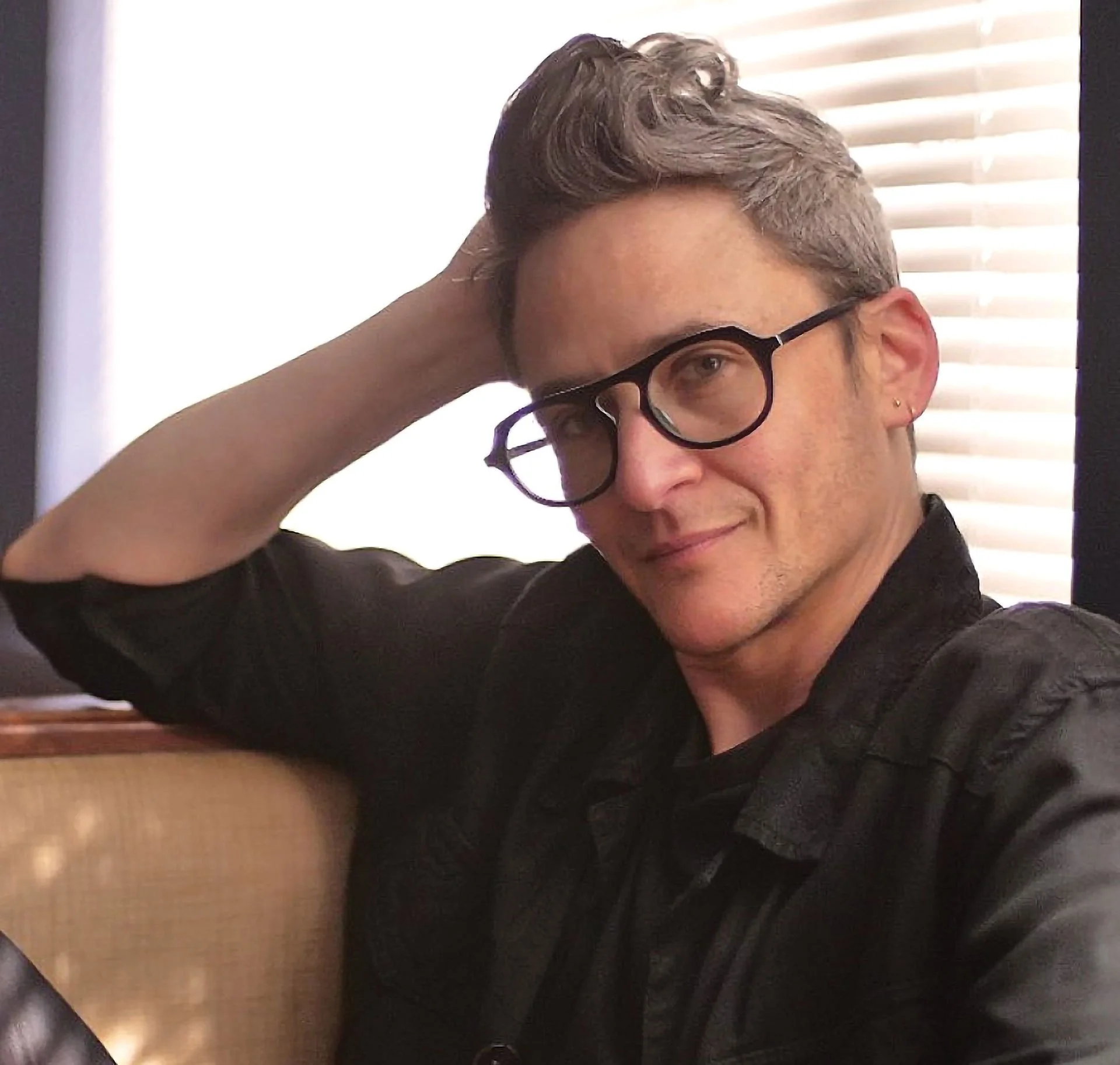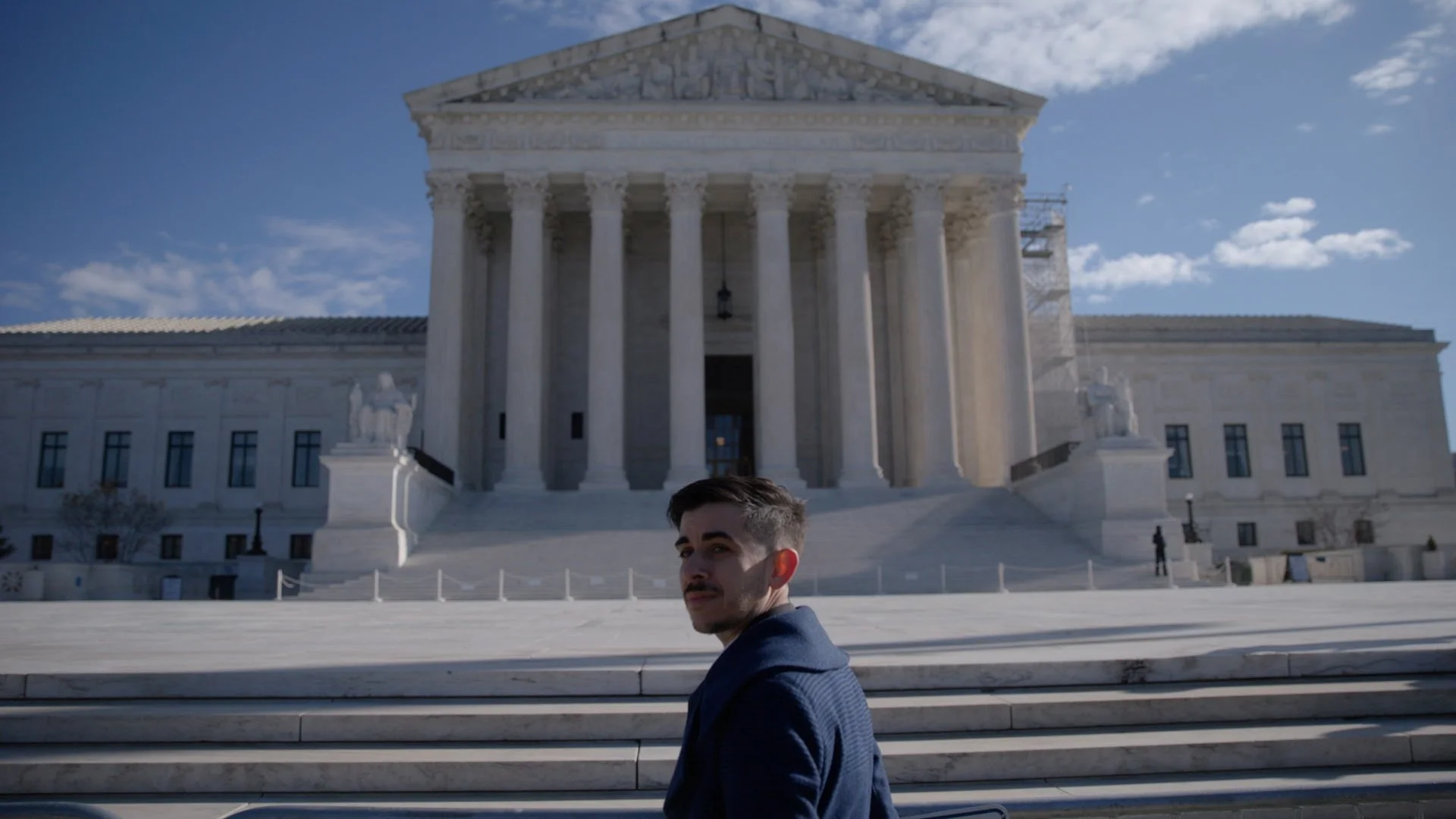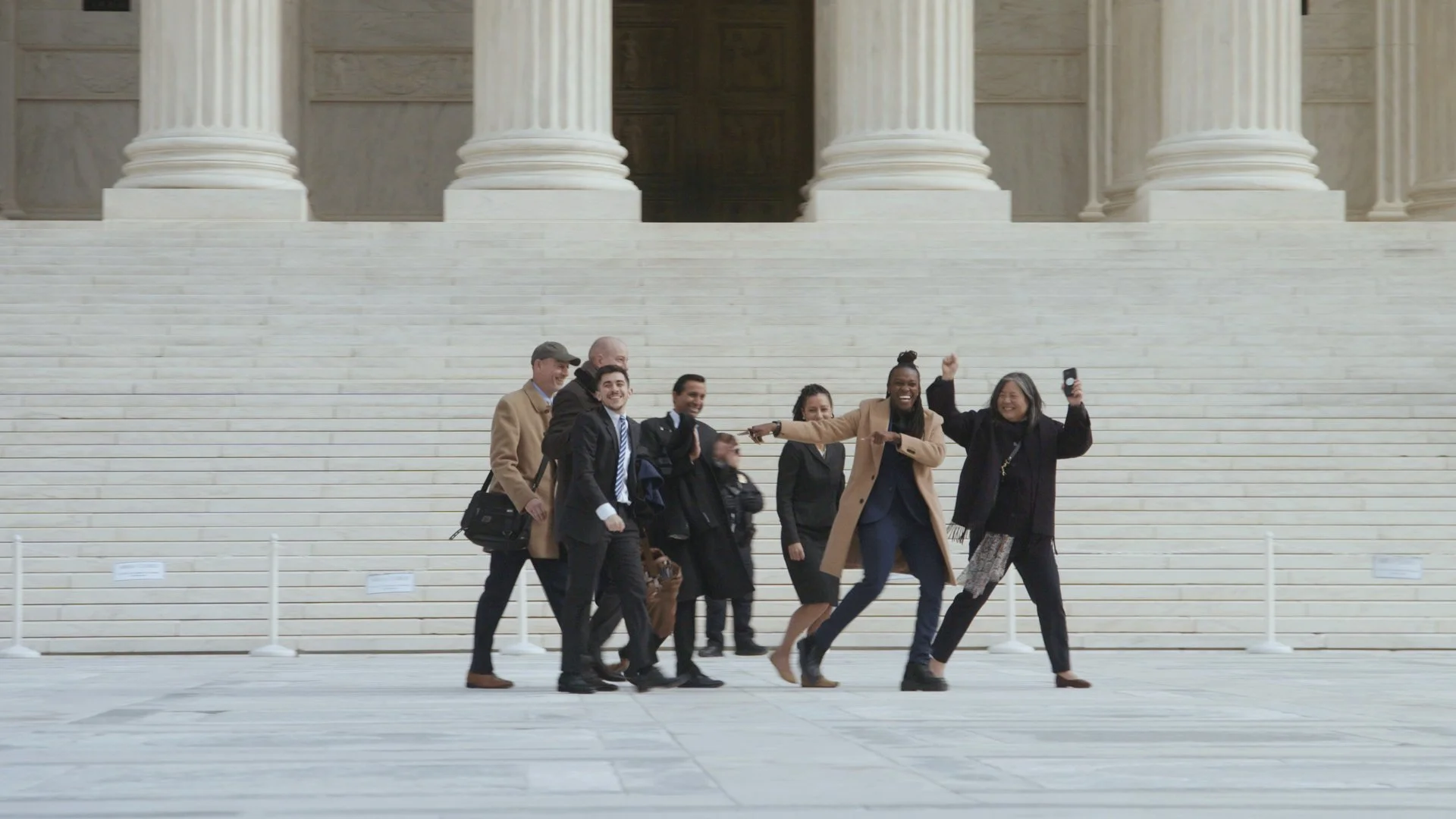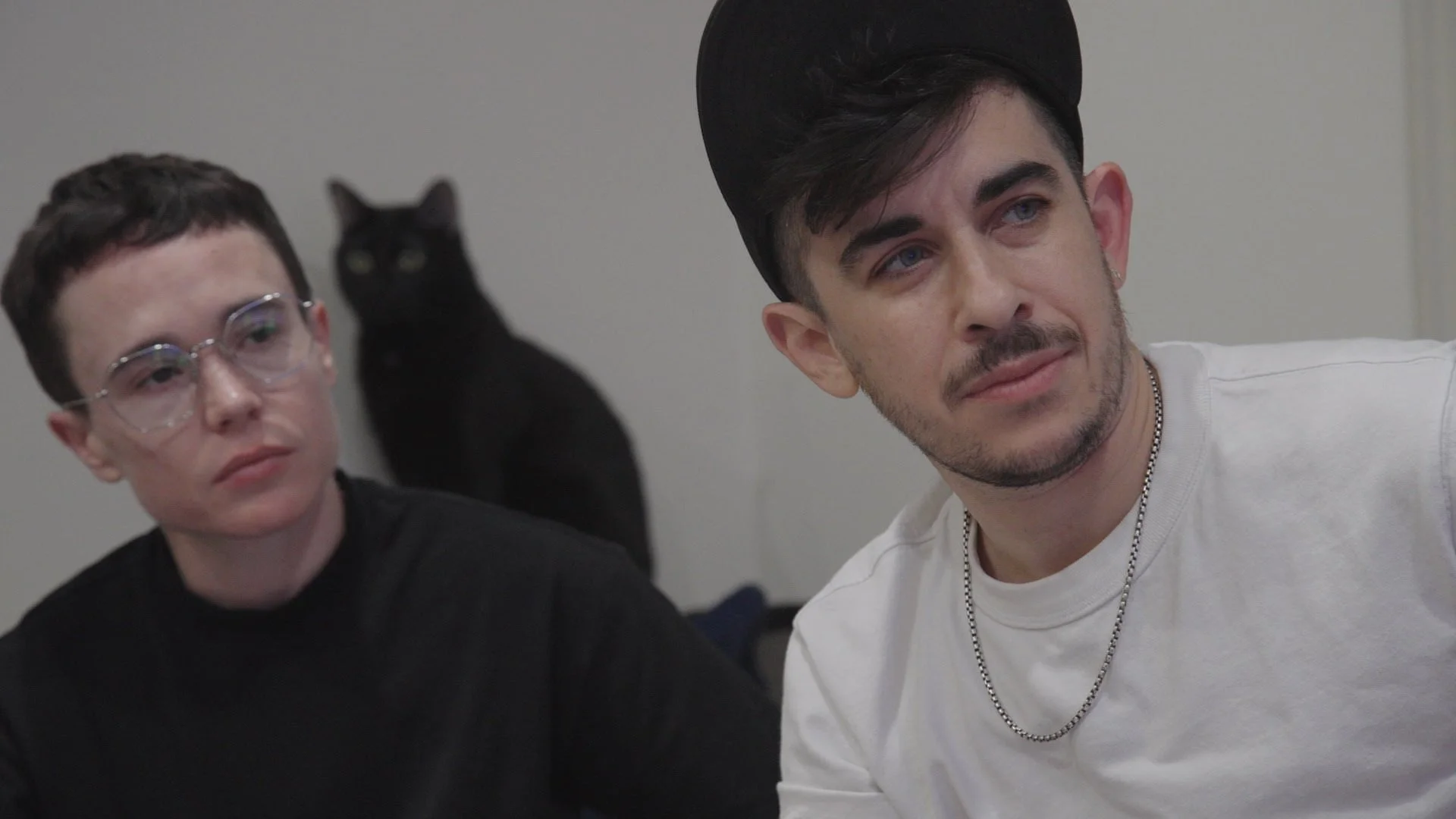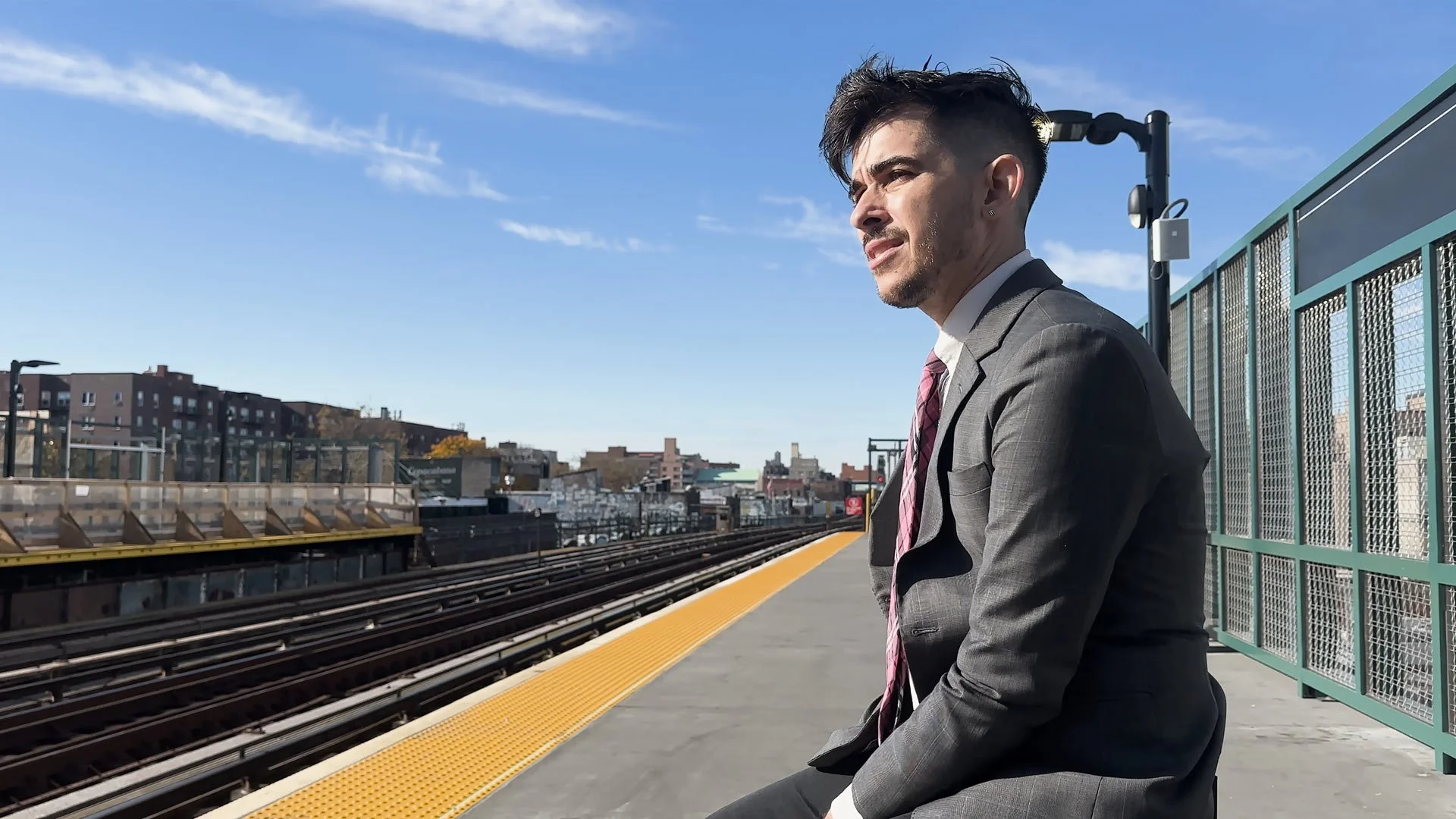Sam Feder Talks Fighting for Trans Rights in “Heightened Scrutiny”
Documentary filmmaking at its best chronicles an issue that’s misunderstood, unknown, or urgent. Director Sam Feder’s Heightened Scrutiny is the rare instance where a film deserves all of those adjectives, and more. The film follows ACLU attorney Chase Strangio as he prepares to argue before the Supreme Court about their decision to uphold a ban on life-saving healthcare for transgender kids. Strangio admits that he never grew up dreaming of the day he would fight in front of the highest court in the land. This battle is personal, and Strangio will make history as the first openly transgender person to argue before the Supreme Court.
Courtesy of Fourth Act Film
At first, Feder didn’t have their attention focused on Strangio and his upcoming Supreme Court battle. Feder previously included Strangio in their film Disclosure, a documentary that dives into Hollywood’s portrayal of transgender people in the movie industry. Before Heightened Scrutiny became the film it is now, Feder saw its purpose as a follow-up on the themes of Disclosure and the changing tides of trans acceptance happening before their eyes.
“Disclosure was arguing that visibility is not always good, and it’s not always helpful for the ones on the streets,” explains Feder. “It doesn’t really help the material realities of most trans people, and we need to prepare ourselves for this backlash.”
“I started to see the backlash happening and I wasn’t sure what I could do about it as a filmmaker. Where could I make an argument or have a voice or have something to say? I had so many things and feelings to say. I’m a media critic, too, so things come from that angle often. I started to understand the direct link between a lot of the mainstream coverage of trans people and how that connected to these anti-trans laws.”
“I was just devastated and terrified, but not surprised because I had seen the ways in which the mainstream media had been beating the drums to incite war with misinformation. We’re going back to the Iraq war, you know? I’ve been seeing this my whole adult life, and knew this to be true about mainstream media. When I saw this connection, I felt that something had to be said about it.”
“While I was thinking about all that, I had this experience on a television set,” Feder goes on. “I was shadowing a director because, for a very short window of time, I was thinking about directing TV. This experience changed my mind very quickly.”
“The director pulled me aside and, mind you, this was on a trans show. The director, who was neither trans nor queer, pulled me aside to say, I just don’t know about the kids. She was like, when I was a teenager, I didn’t really know my sexuality until puberty, how could these kids know? Keeping my composure as much as I could in a professional environment, I just said to her, well, do you know about puberty blockers? And she was like, what’s that?
“I realized how quickly people are coming to these conclusions based on what they’re reading in the mainstream press, ostensibly thinking of themselves as allies. That really catapulted making this film.”
Courtesy of Fourth Act Film
The shift to focus more on Strangio came in part from Strangio himself. Feder began production on Heightened Scrutiny in March of 2024 with interviews from public figures and journalists like Laverne Cox, Tre’Vell Anderson, Gina Chua, and more. When news came that Strangio would be arguing in front of the Supreme Court, the two agreed that someone should document this fight. Strangio first contacted the team behind the 2020 documentary, The Fight, which also featured Strangio, but they didn’t have the bandwidth. When Strangio told Feder the news, Feder said, without hesitation, “I’ll make it work. I’ll find the capacity.”
“Chase asked me why I wanted to do it, and I said, it’s because I want there to be a document for the young people to know that we tried, that we fought, because we know how this is going to go. We know how this is going to end and we know what’s going to come after. I just can’t imagine what it must feel like to be a young person and see all this being done in your name, despite us knowing it’s just going to affect all trans people of all ages. That felt really important to me. That they knew we didn’t leave them out to dry. That we did try and that we are continuing to fight for them.”
One such young person is featured in Heightened Scrutiny. Her name is Mila. She introduces herself in this way: “My name is Mila. I’m twelve years old. I’m in the seventh grade. I speak four languages, and I’m my school student representative. And, of course, I’m a transgender girl.” The audience meets her as she’s speaking out for trans issues on a local school level.
“I love talking about Mila,” beams Feder. “I tell this story a lot, but it’s really my favorite story to tell. When you see Mila in the film, when you first meet her at that school board meeting, that was the day I first met her. It was way before it was announced that Chase would be taking the case. I’d been going to these meetings, this was about the third time I went to one of these meetings just to witness and be a supportive adult.”
Courtesy of Fourth Act Film
“That day, I’m approaching the school and I decided to bring a camera because even my personal friends didn’t believe me that this was happening in New York City. I felt this had to be documented,” states Feder. “As I’m approaching the school with the camera, I see these kids and their parents drawing these beautiful posters. You know how kids are, they’re having fun and it was so delightful to approach this group.”
“Out of the sea of children and young people comes Mila toward me and she says, you have my permission to film me,” laughs Feder. “That was how Mila entered this story. It just sort of happened that she had a preexisting friendship with Chase, and Chase knew her mom. We had been thinking about how to bring a young person’s voice to this story because this is being done in their name.”
“There are a lot of ethical concerns about bringing a young person to a documentary, but Mila obviously wanted to be in it, and she is. She’s got the presence, she’s so wonderful on camera. After a lot of conversations with her family, we decided to do it. Since the film, she got into the high school she wanted to get into, and she’s doing Q&As about the movie on her own now. This summer she was at a camp in Washington, DC, and the ACLU had some screenings and she was running the show.”
On the other end of the spectrum are Feder and Strangio. The two admit that they’re more on the introverted side, certainly when compared to someone like Mila. In an interview before the premiere of Heightened Scrutiny at the 2025 Sundance Film Festival, Feder says they became a filmmaker because they’re “too introverted to be a public activist.” Early in the film, Strangio says he likes his privacy, but recognizes that the role he needs to play is beyond his comfort zone.
“What we bonded over most was not wanting to be in the public. Not wanting to do the public speaking that some filmmakers love. They’re extroverts, they love it. They get a lot of energy from that. I’m much more comfortable with it than I was when I started doing this work.”
“Chase is an advocate. He’s doing the direct work. I’m making films to be in support of people doing the direct work. When I say I’m an introverted activist, I mean I can’t be on the front lines. My system isn’t made for that. It’s been really important for me to find a tool that can then be used for advocacy and activism.”
Courtesy of Fourth Act Film
From a filmmaking perspective, Heightened Scrutiny was both a sprint and a marathon. Initial interviews began in March of 2024, after months of preparation and research. On June 20, 2024, it was announced that the Supreme Court would take the case, which meant that Feder and their crew didn’t start filming until July. December 4 was the day Strangio argued before the court, and Heightened Scrutiny had its world premiere on January 27, 2025.
“Man, so hard. It was so hard,” admits Feder. “Disclosure took me five years. The team on Heightened Scrutiny worked really hard, filming and editing simultaneously.”
“I also felt pretty strongly that support would start slipping in 2025, not only for trans people, but for my work and this film. As films come out, you do the festivals for a year, maybe a year-and-a-half, and then you do the theatrical for six months or something. Then you start doing what’s called Impact Campaigns, which is really great work. It’s when you go to the state level and work with organizers to make change and host educational screenings.”
“We did all that at once. We’ve been going nonstop for a very, very long time pushing, pushing, pushing. Sadly, supporters are dropping the ball on us. A considered-to-be progressive institution that supported my last two films, departed recently because of the political environment. Not surprising, but very sad, hurtful, and scary.”
The case Strangio argued in the film, United States v. Skrmetti, had its decision announced in June. The court, in a vote of 6–3, allowed the Tennessee law to remain in place to continue to ban medically necessary gender-affirming care. While some viewers saw the documentary before the decision, many have seen it since. Feder explains that the reception from community members and festival audiences has remained positive, but the lack of support from larger institutions has dwindled.
“No streaming platform would touch it. Obviously, we went to Netflix first because they bought Disclosure. Granted, they bought Disclosure for pennies. We didn’t make any money, but that’s fine, it got amazing exposure. For Heightened Scrutiny, they said they weren’t taking political films, which is funny because they have. It’s just this topic. That’s been really hard.”
Courtesy of Fourth Act Film
“Besides that, and having to do distribution ourselves, it’s been fantastic. We’ve had over 100 festivals at this point. We’ve had, I think, about 35 theatricals. We had a commercial theater, the Alamo Drafthouse, show it in a couple of cities.”
“Our Impact Campaign is so badass. We’re working on the state level right now. We’ve got seven states in particular that we’re working with in various ways. Whether the film is being shown to legislators to help them brush up on their talking points, or it’s being used by lawyers to help them prepare for cases, or it’s being used by organizers who are trying to push back against anti-trans ballot measures, it’s being used in various ways. It’s very meaningful and exciting.”
Perhaps the most important reception to Feder is the kids because, as they’ve pointed out, the court case in question is about kids. It’s adults arguing about what kids shouldn’t be allowed to do, despite not speaking with any of the children whose lives the gender-affirming care has saved.
“The best response I got was from a friend whose daughter is trans. He brought her to the screening and he said, my daughter has a new hero in Mila. He said, my daughter has never been interested in activism and now she wants to join the fight. That’s beautiful, right? To show a young person who’s the center of these atrocities, to see them feel empowered and have agency. That’s incredible. It gave me chills retelling it.”
For those who aren’t trans, Feder also offers their thoughts on allyship and what it actually means to be a part of the fight as someone who doesn’t identify as transgender.
“bell hooks says love is a verb. I feel like activism is action, right? Activism is a verb. You have to be doing something. You have to be in the fight. You have to have something at stake. You have to be following what the people you’re saying you support are saying and what they need. Sometimes you just have to accept. You don’t necessarily have to understand.”
“That’s something I work on with my family. You don’t have to understand all my decisions, you just have to accept them if you want a relationship. That’s what love is and that’s what allyship is. It’s believing the people who are at the center of the fight and supporting them, and certainly not questioning their fundamental human rights. “
“It’s beyond putting your pronouns in your email signature, right? It’s about speaking up for people. It’s about standing up for people. It’s about pushing back when you’re hearing other people question our rights. I was at a screening just last week, last Thursday. This man, cis straight white dude, stood up and was just like, what can we do? Which is a question we get a lot right in that moment, especially looking at a cis white man, a very privileged human in the world. I was like, just support us, just back us up, stand up for us. Sure, write letters to your legislator, support doctors, there’s so much minutia. If you’re coming from a place of, I will go down for you, I’ve got your back…that’s allyship.”
Support Your Local Film Critic!
~
Support Your Local Film Critic! ~
Beyond the Cinerama Dome is run by one perpetually tired film critic
and her anxious emotional support chihuahua named Frankie.
Your kind donation means Frankie doesn’t need to get a job…yet.
Follow me on BlueSky, Instagram, Letterboxd, YouTube, & Facebook. Check out Movies with My Dad, a new podcast recorded on the car ride home from the movies.

